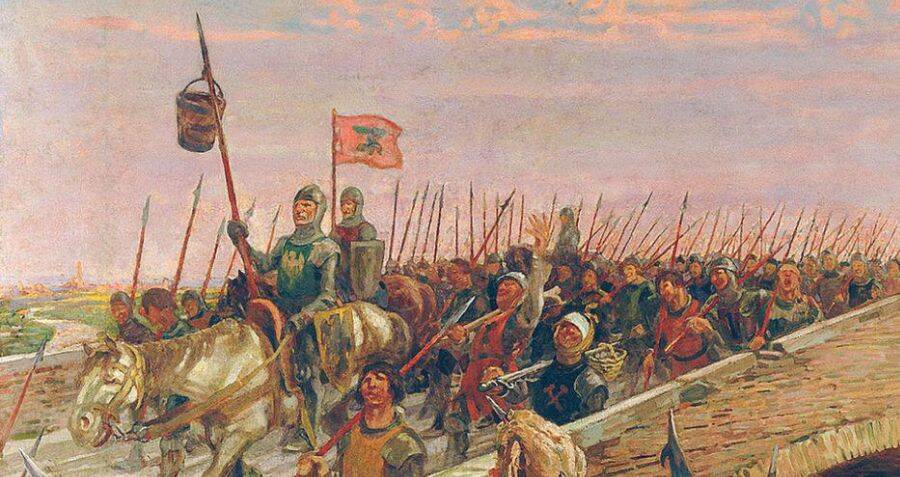“It gives us a glimpse into live comedy and entertainment in the Middle Ages that would otherwise be lost,” Wade said, noting some of the similarities between the minstrel’s jokey style and comedy that remains popular today. A minstrel was a lowly entertainer who traveled between alehouses to sing (often bawdy) tales that riffed on the daily grind of peasant life, mocking the audience and their feudal overlords alike. Their existence across medieval Europe is well chronicled, but — given that most minstrels were illiterate — no other direct evidence of their comedy repertoire from that period survives in England. Wade argues that this makes the Heege manuscript unique. “It was written by a scribe that went to the performances of a minstrel,” he said, based on a fresh analysis of the text that notes its scripted audience interaction, wicked sense of humor and the brevity of each of the acts, making them well-suited for meal breaks.
“The minstrel is self-ironizing. It engages with situational comedy, with slapstick, with humor based on crude bodily functions,” he said, adding that the joke book also contains a self-referencing — or meta — element that lends it a modern sensibility. The riffs also include the first known use of the term “red herring” to mean a distraction. A rabbit executes a hunter in the Smithfield Decretals manuscript, decorated in London in the 1340s. (British Library)
The performer’s jokes paint a lively picture of late-medieval English humor, inverting everyday scenes for comic effect and frequently showing peasants and kings being stung by their own stupidity or greed.
In one pamphlet, titled “The Hounding of the Hare,” dimwitted peasants set out to hunt rabbits. In the chaos and confusion of the chase, the hunters end up preying on each other instead. The scene is so topsy-turvy that one of the peasants becomes terrified that the rabbit will murder him, rather than the other way around. At one point, the tale goes like this (all stories here translated by Wade from Middle English):
Jack Wade was never so sad as when the hare trod on his head in case she would have ripped out his throat.
The specter of the killer bunny — familiar to fans of the 1975 film “Monty Python and the Holy Grail” — recurs throughout medieval English literature,
according to the British Library, even appearing in Chaucer’s “The Canterbury Tales” one century before the Heege manuscript was produced. Turning the docile, four-legged animal from prey to predator had specific resonance to medieval ears, as many of those hearing the riff would have spent their lives working alongside animals.
Animals provide a constant source of humor in the minstrel’s routine. In another sketch, the entertainer tells of a time he entered a church to discover its pews were populated entirely by fish. There’s also the time he attended a feast cooked and served by a fox playing the fiddle, with a bumble bee on the hornpipe. Perhaps unsurprisingly, the riffs contain their share of cruder jokes, too. In one, a man becomes haunted by incontinence after receiving a blow to his backside:
Therefore soon he was hit on the back, forever after his bottom said “quack” — whenever he should rise to walk.
Another routine takes the form of a mock sermon that ridicules the priesthood — of which only one or two other examples survive today, according to Wade. In one, the minstrel suggests the Eucharist may actually be a meat sausage. In another, he extols the virtues of heavy drinking and suggests God-fearing folk should make sure to finish off their pints if they want a spot in heaven:
If you have a big tanker in your hand and it’s full of good ale and you leave any beer inside — you’re putting your soul at great risk. These men said in the Bible that someone who’s bad at drinking is not likely to go to heaven.
“In the 15th century, that was a really edgy thing to do,” Wade said. “The lack of survival suggests it’s right on the cusp of acceptability,” he added — comparing the mock-sermon genre to the modern equivalent of a comic satirizing a politician.
Minstrels would frequently deliver their performances at medieval alehouses — meaning there’s a good chance the cheeky joke was intended to poke fun at the drunken crowd, too, Wade said. Elsewhere in the mock sermon, the entertainer tells an absurd story of a gluttonous group of kings who stuff themselves with so much gruel that they transform into “red herrings.”
There was once a king and he made a great feast, and he had three kings at his feast. And these three kings ate one dish of gruel. And they ate so much that their bellies burst. And out of the bellies came 24 oxen sword-fighting. And there were left no more alive but three red herrings.
The joke is that mighty aristocrats become useless as soon as they get merry together. “That way of making jokes — of taking people who are high and bringing them low — that is sort of universally funny,” Wade said. Medieval peasants relaxed after a hard day’s toil in the field much in the same way as their modern counterparts switch off by turning on the television, Wade said. “They were doing many of the same kinds of stuff that we get up to,” he said. “Go to your favorite pub or inn or tavern or alehouse and put your feet up for the evening. Drink some beer, eat some nice food and listen to some entertainment.”










